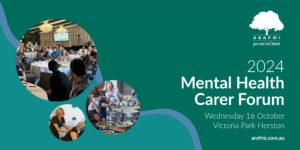Last week Arafmi Ltd attended the 2nd NDIS Mental Health Conference, our CEO was invited to speak at the Lived Experience workshops alongside Tania Curlis and Amaya Alvarez from Tandem.
He chose to speak about ‘Life Without Respite’ and understanding the struggle to access respite services and its impact upon carers and their families. Unfortunately, this topic is becoming more and more popular due to the shortcomings of NDIS, we feel strongly about sharing this abstract.
Last year, I brought to the conference a presentation that invited the audience to contemplate what it would mean to have no mental health respite services. In Queensland with the federal Mental Health Respite: Carer Support (MHR:CS) funding being rolled into the NDIS and little remaining state funding for mental health respite, life without respite is becoming a reality for some people with mental illness and their carers.
Arafmi Ltd has been supporting mental health carers for over 40 years. We currently have five respite houses for people with mental illness across South East Queensland. These houses provide people with a mental illness a friendly and supportive environment where they can take a break from daily life stressors and participate in a range of engaging activities. They also provide people with an opportunity to connect and socialise with others with relatable experiences and to develop independent living skills.
Perhaps most importantly, respite is an essential resource that many people draw upon in their recovery journeys to maintain their wellness during episodes of mental ill-health.
For carers, respite provides a much-needed break where they can take time to recharge and pursue their own needs. For some carers, this opportunity to look after their own wellbeing allows them to sustain their caring role over the long-term. It can also help them retain their employment, pursue further studies and maintain social and familial relationships.
Across Australia, it has been estimated that 200,000 of people living with complex and sometimes severe mental illness will not be eligible for the NDIS. Others will not apply or engage with the NDIS for a range of reasons including the complexity of NDIS processes and systems, incongruence with language around permanency and disability and lack of recognition of their own mental illness diagnosis.
Among the considerable number of people living with complex mental illness, who are not transitioning to the NDIS, are people who previously accessed, and benefited from, respite services. In addition to this, there are people eligible for the NDIS who have accessed respite in the past but have not had it included in their NDIS packages.
With the MHRCS and state-based funding being rolled into the NDIS, these groups of people are now facing a life without respite.
If you have any questions about this article, accessing the NDIS or need someone to talk to, you can call Arafmi any time of the day on 07 3254 1881. It’s comforting to know that when you need to talk – someone who understands will be there – at any hour.



